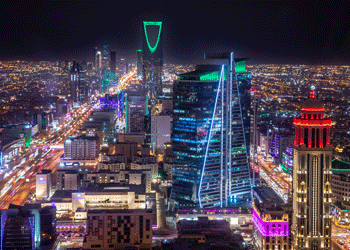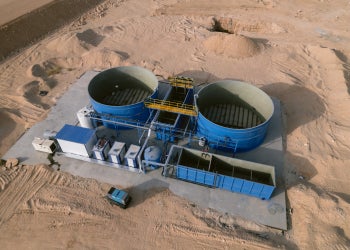GCC rail projects attract global attention
20 February 2024

Progress on planned rail projects across the GCC has been a stop-start affair over the past decade.
While significant progress was made on Etihad Rail phases two and three in 2018, and work continued on the Riyadh and Doha metros, both awarded in 2013, little progress was made on major rail schemes such as the Saudi Landbridge, Bahrain Metro and Kuwait Metro.
Other significant schemes, including the Abu Dhabi and Jeddah metros, were put on hold.
With key opportunities not progressing, many international rail contractors gave up on the region and looked for opportunities elsewhere.
The decline in project activity was due to two factors. The first was the effect of low oil prices on government spending. The second, more subtle reason was a lack of high-level political buy-in. Rail projects were not a priority for the region’s leaders.
Today, the sentiment for rail in the GCC could not be more different. Progress is being made on a range of large-scale railway schemes, hence offering huge opportunities for international contractors to return to the region.
The spike in project activity levels in the regional rail sector means contractors will have plenty of opportunities to choose from.
The turning point came in January 2021 when GCC countries signed the Al Ula agreement. The official announcement by the GCC secretariat effectively restarted the GCC railway project, which will connect all six GCC countries with a sprawling railway link.
Since then, a string of recent moves and statements have meant all six bloc members have either declared or signalled their plans for their sections of the rail network.
Major markets
Saudi Arabia and the UAE stand out in terms of work opportunities for international contractors. Saudi Arabia, in particular, has moved towards starting significant rail projects, including the Saudi Landbridge and Riyadh metro extension.
The kingdom is preparing to start work on the $7bn Saudi Landbridge project this year as the negotiations for the final cost and financing of the project reach the closing stages.
Contractors will also be eyeing the doubling of the second track on the North-South Railway (NSR) network. In January, Saudi Arabia approved the project at an estimated investment of SR4bn ($1bn).
The Royal Commission for Riyadh City (RCRC) also received prequalification forms from consortium companies for the tender to design and build the next phase of the Riyadh Metro project. Three teams of local and international contractors have formed to bid for the contract.
The other significant railway scheme in the market is the Riyadh Metro Line Two extension, for which the Royal Commission for Riyadh City (RCRC) has issued a tender notice. According to sources close to the project, the tender is open only to the contracting groups working on the Line Two scheme.
These significant undertakings will link key cities and industrial hubs to boost the country’s logistics and industrial sectors and improve passenger transport infrastructure, especially in Riyadh.
In the UAE, the country has announced the partial completion of the Etihad Rail scheme, with freight trains beginning operations in February.
The country is now looking to strengthen its rail infrastructure further as it begins the procurement process for a railway link connecting the UAE with its neighbour Oman.
Oman Etihad Rail Company received bids in February from several consortiums comprising a mix of local and international contractors for three civil works packages for the UAE-Oman railway project.
The country is also preparing to start construction on the UAE’s high-speed rail project after asking contractors to express interest in the early works for the line connecting Abu Dhabi and Dubai. The client is expected to launch the prequalification process for the main contract tender in Q2 of this year.
Meanwhile, tendering activity is ramping up for the highly anticipated Dubai Metro’s new Blue Line. Dubai’s Roads & Transport Authority (RTA) has set a deadline of 19 May for consortiums to submit their bids for the design and build contract. It is one of Dubai’s largest upcoming infrastructure schemes, requiring international contractors to work in a joint venture with local partners.
Contractors have started work on the first phase of Abu Dhabi’s long-awaited light rail transit (LRT) system. The local National Infrastructure Construction Company (NICC) and National Projects & Construction (NPC) are carrying out the construction work.
Upcoming opportunities
In the coming years, several upcoming rail schemes in other GCC countries will also provide ample work opportunities for rail contractors.
Last year, Oman invited firms to prepare a pre-feasibility outline for the first phase of its planned Muscat Metro network. The project has long been discussed, and the tender for the preliminary consultancy work is a major step as it signals the government’s ambition to deliver the project.
Other planned metro projects are at a more advanced stage. Bahrain is expected to develop the initial phase of the upcoming metro scheme imminently. In February last year, Bahrain’s Transportation & Telecommunications Ministry prequalified firms that could bid for the tender for the upcoming project.
There are plans to extend the Red, Green and Gold lines in Doha, and the tendering activity is expected to start soon.
As projects move forward, the GCC’s railway sector presents a promising pipeline for contractors to capitalise on. With ambitious infrastructure projects under way and planned across the region, these schemes are expected to generate significant demand for skilled professionals and contractors.
By leveraging their expertise in the regional rail sector, contractors have the chance to play a vital role in shaping the future of transport in the region while filling their order books for years to come.
Exclusive from Meed
-
 Solar deals signal Saudi Arabia’s energy ambitions
Solar deals signal Saudi Arabia’s energy ambitions13 February 2026
-
 Saudi Arabia appoints new investment minister
Saudi Arabia appoints new investment minister13 February 2026
-
 Indian firm wins major Oman substation contract
Indian firm wins major Oman substation contract12 February 2026
-
 Developers appoint contractor for $500m wastewater treatment project
Developers appoint contractor for $500m wastewater treatment project12 February 2026
-
 Dewa raises Empower stake in $1.41bn deal
Dewa raises Empower stake in $1.41bn deal12 February 2026
All of this is only 1% of what MEED.com has to offer
Subscribe now and unlock all the 153,671 articles on MEED.com
- All the latest news, data, and market intelligence across MENA at your fingerprints
- First-hand updates and inside information on projects, clients and competitors that matter to you
- 20 years' archive of information, data, and news for you to access at your convenience
- Strategize to succeed and minimise risks with timely analysis of current and future market trends

Related Articles
-
 Solar deals signal Saudi Arabia’s energy ambitions
Solar deals signal Saudi Arabia’s energy ambitions13 February 2026
 Commentary
Commentary
Mark Dowdall
Power & water editorSaudi Arabia’s recent agreement to build $2bn-worth of solar power plants in Turkiye is the latest sign that the kingdom’s energy influence is changing.
Historically, this was measured in oil barrels and export volumes. Increasingly, this is extending to capital, structuring expertise and the ability to deliver record-low tariffs in competitive markets.
Announcing the deal, Turkish Energy Minister Alparslan Bayraktar said tariffs for the plants would be the country’s lowest on record, with electricity purchased under 25-year power purchase agreements.
It followed another announcement, in January, that Acwa is investing $200m to build a large-scale solar photovoltaic (PV) plant in the Philippines.
Whether Saudi-backed companies ultimately retain long-term stakes or primarily develop and build the assets, their role at the front end is significant.
Sponsors that bring sovereign backing, clear procurement processes and access to low-cost financing can influence tariffs and contract terms from the outset.
There is also a geopolitical layer. Investing in Turkiye, or anywhere for that matter, strengthens political and economic ties at a time when regional alignments are shifting.
Energy infrastructure is also long-term by its nature. It connects ministries, regulators, lenders and operators in relationships that often extend well beyond a single transaction.
Saudi Arabia has spent the past few years refining its approach to pricing, structuring and financing large-scale renewables at home.
Exporting that expertise may not rival oil in scale or visibility, but it does signal that Saudi Arabia is becoming more than just an energy supplier.
Increasingly, it is becoming a participant in how other countries design and finance their energy transitions. That influence is still significant.
https://image.digitalinsightresearch.in/uploads/NewsArticle/15645903/main.jpg -
 Saudi Arabia appoints new investment minister
Saudi Arabia appoints new investment minister13 February 2026
Register for MEED’s 14-day trial access
King Salman Bin Abdulaziz Al-Saud has made a series of senior government changes, including Khalid Al-Falih leaving his role as investment minister to become minister of state and a member of the cabinet.
Al-Falih has been replaced by Fahad Al-Saif as investment minister. Al-Saif has been head of the Investment Strategy and Economic Insights Division at the Public Investment Fund (PIF) since 2024. That role involved formulating PIF’s long-term investment strategy. He has also served as head of the Global Capital Finance Division, a role he has held since joining PIF in 2021.
The change of investment minister comes at a time when securing investments has become a key priority for Saudi Arabia as it prepares to hand over more projects to the private sector for delivery.
King Salman also named Abdullah Al-Maghlouth as vice-minister of media and Abdulmohsen Al-Mazyad as vice-minister of tourism. Khalid Al-Yousef was named attorney general, and Sheikh Ali Al-Ahaideb will serve as president of the Board of Grievances.
Faihan Al-Sahli was selected as director general of the General Directorate of Investigation, while Abdulaziz Al-Arifi was chosen to lead the National Development Fund. Haytham Al-Ohali will head the Communications, Space and Technology Commission, and Fawaz Al-Sahli will chair the Transport General Authority.
https://image.digitalinsightresearch.in/uploads/NewsArticle/15645415/main.gif -
 Indian firm wins major Oman substation contract
Indian firm wins major Oman substation contract12 February 2026

India’s Larsen & Toubro has won a contract to build the Majan 400/220/132kV grid station in Oman.
Estimated to cost $100m, the project includes an associated 400kV line-in line-out underground cable from Sohar Free Zone to the Sohar Interconnector Station.
The contract was awarded by Oman Electricity Transmission Company (OETC), part of the government-owned Nama Group.
The grid station will comprise eight 400kV gas-insulated switchgear (GIS) bays, eight 220kV GIS bays and 10 132kV GIS bays at the new Sohar Free Zone substation.
The scope includes the installation of two 500MVA, 400/220kV transformers and two 500MVA, 220/132kV transformers.
Local firm Monenco Consulting Engineers was appointed in April last year to provide design and supervision services for the project.
As MEED exclusively revealed, the main contract was tendered in June, as part of three significant contracts to build new substations in the sultanate.
The second contract, worth about $35m, covers the construction of the Sultan Haitham City 132/33kV grid station and associated 132kV line-in line-out underground cables running 4 kilometres from Mabella to Mabella Industrial Zone.
The third contract, valued at about $100m, covers the construction of the Surab 400/33kV grid station and an associated 400kV line-in line-out cable from the Duqm grid station to the Mahout grid station.
Local firms Muscat Engineering Consulting and Hamed Engineering Services are consultants for the Sultan Haitham City and Surab projects, respectively.
The two remaining contracts are currently under bid evaluation, with awards expected this quarter.
https://image.digitalinsightresearch.in/uploads/NewsArticle/15638107/main.jpg -
 Developers appoint contractor for $500m wastewater treatment project
Developers appoint contractor for $500m wastewater treatment project12 February 2026

Register for MEED’s 14-day trial access
Egypt’s Orascom Construction has won the engineering, procurement and construction (EPC) contract for a major wastewater treatment project in Saudi Arabia’s Eastern Province.
A consortium of Saudi utilities provider Marafiq, the regional business of France’s Veolia and Bahrain/Saudi Arabia-based Lamar Holding is developing the $500m (SR1.875bn) industrial wastewater treatment plant (IWWTP) in Jubail Industrial City 2.
Sources close to the project confirmed the appointment to MEED, adding that the project has now entered the construction phase.
Industry sources also said that financial close on the project is expected to be reached in the coming days.
In September, the developer consortium was awarded a contract, under a 30-year concession agreement, by Saudi Aramco Total Refining & Petrochemical Company (Satorp), a joint venture of Saudi Aramco and France’s TotalEnergies.
The planned facility will treat and recycle wastewater from Satorp’s under-construction Amiral chemical derivatives complex, also in Jubail.
Marafiq, formally Power & Water Utility Company for Jubail and Yanbu, will own a 40% stake in the dedicated project company. Veolia Middle East SAS will hold a 35% stake, and Lamar Holding’s Lamar Arabia for Energy will hold the other 25%.
The planned IWWTP, which will primarily serve the $11bn sprawling Amiral chemicals zone, will implement advanced water treatment and recovery technologies to process complex industrial effluents, including spent caustic streams. Treated water will be reintegrated into the industrial processes, supporting closed-loop reuse and energy efficiency.
The project follows a concession-style model, akin to a public-private partnership (PPP), where the developer consortium invests in, builds and operates the wastewater plant over a 30-year period, with returns linked to service delivery.
Marafiq has been involved in several similar projects across Saudi Arabia, including as the sole owner of the Jubail industrial water treatment plant (IWTP8), which treats complex industrial effluents for petrochemical and heavy industrial companies.
In 2020, Saudi Services for Electro Mechanic Works was awarded the $202m main contract for the fourth expansion phase of IWTP8. Construction works on the project are expected to be completed by the end of the quarter.
 READ THE FEBRUARY 2026 MEED BUSINESS REVIEW – click here to view PDF
READ THE FEBRUARY 2026 MEED BUSINESS REVIEW – click here to view PDFSpending on oil and gas production surges; Doha’s efforts support extraordinary growth in 2026; Water sector regains momentum in 2025.
Distributed to senior decision-makers in the region and around the world, the February 2026 edition of MEED Business Review includes:
> AGENDA: Mena upstream spending set to soar> INDUSTRY REPORT: MEED's GCC water developer ranking> INDUSTRY REPORT: Pipeline boom lifts Mena water awards> MARKET FOCUS: Qatar’s strategy falls into place> CURRENT AFFAIRS: Iran protests elevate regional uncertainty> CONTRACT AWARDS: Contract awards decline in 2025> LEADERSHIP: Tomorrow’s communities must heal us, not just house us> INTERVIEW: AtkinsRealis on building faster> LEADERSHIP: Energy security starts with rethinking wasteTo see previous issues of MEED Business Review, please click herehttps://image.digitalinsightresearch.in/uploads/NewsArticle/15637523/main.jpg -
 Dewa raises Empower stake in $1.41bn deal
Dewa raises Empower stake in $1.41bn deal12 February 2026
Dubai Electricity & Water Authority (Dewa) has announced it has increased its stake in Emirates Central Cooling Systems Corporation (Empower) from 56% to 80%.
The transaction was completed through the purchase of 2.4 billion shares and the transfer of the entire ownership of Emirates Power Investment (EPI), which is wholly owned by Dubai Holding.
The total value of the deal is AED5.184bn ($1.41bn).
Empower currently holds over 80% of Dubai’s district cooling market and operates 88 district cooling plants across the emirate.
According to MEED Projects, the UAE’s district cooling sector currently has nine projects worth $1.29bn in the pre-execution phase.
Empower has ownership in four of these projects, which have a combined value of $472m.
This includes a $200 million district cooling plant at Dubai Science Park, with a total capacity of 47,000 refrigeration tonnes serving 80 buildings.
Empower signed a contract to design the plant last August, with construction scheduled to begin by the end of the first quarter of 2026.
The utility is also building a district cooling plant at Dubai Internet City.
UAE-based TMF Euro Foundations was recently appointed as the enabling and piling subcontractor for the project.
https://image.digitalinsightresearch.in/uploads/NewsArticle/15635949/main.jpg


